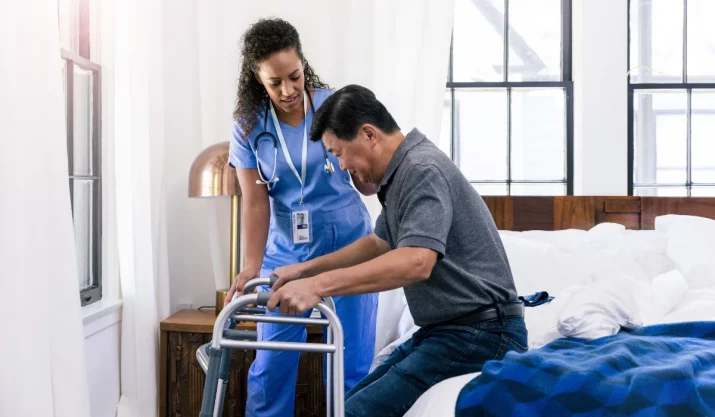What Causes Elderly Fatigue?

Table of Contents
*Disclaimer: California Mobility is not a medical professional. Always refer to your medical provider for guidance related to health symptoms and concerns.
For many older adults, feeling constant exhaustion is nothing new. Elderly fatigue, or fatigue affecting older adults, is a common phenomenon, but that doesn’t mean there’s nothing you can do about it.
Practicing a healthy lifestyle, seeking medical support, and pinpointing what may be influencing your energy levels can help you kick fatigue to the curb. Below, we explore common causes of fatigue and what you can do to mitigate them.
Key Takeaways
- Fatigue is common in older adults and is usually tied to chronic health conditions, pain, sleep problems, and health changes related to aging.
- Most causes of fatigue can be treated with simple lifestyle changes. Others might require medical intervention.
- Treating fatigue from the source can help boost your overall quality of life and well-being.
Chronic Medical Conditions
Long-term medical conditions are a leading cause of chronic fatigue in older adults. Some health conditions directly affect sleep, while others can strain the body enough to drain energy over time.
Examples of conditions often associated with a lack of energy include:
- Heart disease
- Liver disease
- Kidney disease
- Thyroid disorders
- Diabetes
- Fibromyalgia
- Chronic obstructive pulmonary disease
- Parkinson’s disease
Chronic conditions like these tend to become more common as a person goes through the aging process and disproportionately affect older adults.
Remedies for Fatigue from Chronic Medical Conditions
In most cases, treating the underlying condition itself is the best way to approach fatigue caused by medical problems. This may involve taking prescription medications, maintaining a healthy lifestyle, and regularly visiting your healthcare provider.
While treating medical conditions, you can manage fatigue by ensuring you get a good night’s sleep, eating a well-rounded diet, and giving yourself time to rest when needed.
Anemia
When too few red blood cells are available in the body to carry oxygen, a condition known as anemia may be to blame. Different types of anemia can cause various effects, but each may also lead to chronic fatigue.
Other common anemia symptoms include:
- Weakness
- Dizziness
- Chest pain
- Cold hands and feet
- Shortness of breath
- Irregular heartbeat
Without enough oxygen, the body can’t receive the energy it needs, resulting in intense feelings of tiredness.
Remedies for Fatigue from Anemia
Talk to your healthcare provider to determine the best treatments for your anemia and fatigue. Some types of anemia are caused by a lack of vitamins the body uses to create red blood cells and take in iron. In this case, eating a healthy, balanced diet can help you get the nutrients you need to stay healthy.
Treating the cause of the anemia, whether it be a vitamin deficiency or unrelated health issues, is the key to relieving fatigue.
Untreated or Long-Term Pain
Pain significantly affects the body, especially when combined with inflammation. A chronic inflammatory response can contribute to low energy levels.
Conditions like rheumatoid arthritis that cause pain and inflammation are common causes of fatigue. Plus, a lack of mobility caused by pain may exacerbate tiredness.
Remedies for Fatigue from Pain
When chronic pain begins to affect energy levels, there are some steps you can take to help, including those below.
- Prescription Treatments: Talk to your doctor to learn if prescription pain medications may help you manage your symptoms.
- Mobility Aids: Options like walkers, canes, wheelchairs, and other mobility devices make it possible to experience daily life without triggering pain. Fewer pain flare-ups often mean less extreme fatigue. At California Mobility, we offer high-quality mobility and safety products to help you stay independent as you navigate daily activities.
- Regular Exercise: When possible, engaging in regular movement can help lessen pain. Muscle tightness, joint stiffness, and other pain-related symptoms often improve with light, consistent exercise.
Dehydration
Fatigue can be a telltale sign of dehydration, especially chronic dehydration. Research suggests hydration levels may even correlate with sleep-wake cycles. The more hydrated a person is, the more likely they are to get enough sleep and feel energized during the day.
Unfortunately, for many older adults, keeping up with hydration can be challenging due to limited mobility or access to resources.
Remedies for Fatigue from Dehydration
If you suspect you may be dehydrated, the solution is simple — drink more clear fluids as often as possible. Aim to drink whenever you’re thirsty for the best results. Urine that is light yellow or clear is a sign of good hydration.
If keeping up with water consumption is difficult, options like tea, juices, and seltzer can be great alternatives. Try to remember to drink at least once every hour to ensure you deliver regular hydration to your body throughout the day.
Sleeping Problems
Sleep disorders and sleep-related health conditions that make it hard to get quality rest can leave you feeling tired the next day, no matter how long you sleep. Examples of common sleep problems include:
- Having trouble falling or staying asleep (insomnia)
- Sleep apnea, a condition that causes periods of halted breathing throughout the night
- Chronic pain, which may make comfortable sleep elusive
Remedies for Fatigue from Sleeping Problems
Depending on your sleep challenges, potential remedies to consider may include those below.
- Exercise: Regular physical activity you enjoy helps you spend excess energy and can promote restful sleep. Exercise is also linked to lower feelings of depression and anxiety.
- Mindfulness: Activities like yoga, breathing exercises, and meditation can lower stress and help you sleep better. Try incorporating these habits into your nighttime routine.
- Sleep Hygiene: Try to go to sleep and wake up around the same time each day, and limit caffeine consumption in the evening. Avoid frequent or lengthy naps to ensure you reach an appropriate level of tiredness at night.
- Medical Support: Professional treatment may be necessary to address underlying causes like mental health disorders or chronic illnesses.
Hormonal Shifts
Hormone levels decline as a person ages, regardless of their sex. Lower amounts of hormones like estrogen and testosterone contribute to cognitive, emotional, and physiological changes. These shifts may affect different areas of life that can affect energy levels, including:
- Sleep
- Mood
- Appetite
- General health and wellness
Remedies for Fatigue from Hormonal Changes
While there isn’t much you can do about the natural hormonal changes that come with aging, you can mitigate their effects. For instance, regular exercise might help you combat insomnia, and seeking mental healthcare may offset some of the effects of mood changes.
Depression or Anxiety
Both anxiety and depression are known to impact energy levels. Sleeping too little or too much can be a symptom of either condition. Likewise, each condition can interfere with sleep quality and further increase a person’s chances of chronic fatigue.
Remedies for Depression or Anxiety Fatigue
To treat anxiety or depression fatigue, it’s likely necessary to address your mental health. Consider speaking with a licensed therapist or another mental health professional to develop the right treatment plan for you. Other practices, such as mindfulness and meditation, can help you manage milder symptoms.
Certain Prescription Drugs
Fatigue is a side effect of many prescription and over-the-counter medications, including:
- Antihistamines (such as Benadryl)
- Antidepressants
- Pain medications
- Medicines for nausea
Older people may be more likely to take prescription medications than younger populations, meaning they’re especially prone to fatigue with this cause.
Remedies for Fatigue from Prescription Drugs
In some cases, discontinuing the use of certain medications may be necessary to fully overcome fatigue. In others, dosage changes or switching to a different drug might help. It’s best to talk to your healthcare provider to determine which solutions best suit your needs.
While fatigue may be somewhat difficult to fully avoid, it’s usually easy to address. Take good care of your body, and don’t be afraid to ask for help when you need it; your body and mind will likely thank you for it.








